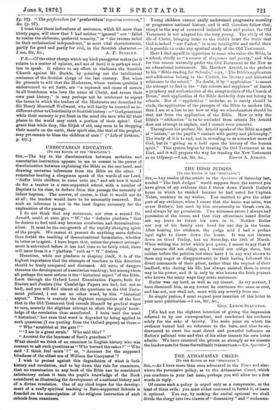UNSECTARIAN EDUCATION.
[TO THE EDITOR OF THE " SPECTATOR:I
SIR,—The key to the discrimination between sectarian and unsectarian instruction appears to me to consist in the power of discrimination between explaining the Bible on the one hand, and drawing sectarian inferences from the Bible on the other. I t-emember hearing a clergyman speak of the words of our Lord, "Suffer little children to come unto me," and ask how it would do for a teacher in a rate-supported school, with a number of Baptists in his class, to deduce from this passage the necessity of infant baptism. The answer, of course, is that it would not do at all ; the teacher would have to be summarily removed. But such an inference is not in the least degree necessary for the explanation of the passage.
I do not think that any statesman, nor even a second Dr. Arnold, could at once give "".V." the "definite platform" that be desires to find mid-way between secularism and denomination- alism. It must be the out-growth of the rapidly changing spirit of the people. We cannot at present do anything more definite than forbid the teaching of denominational formularies, whether in letter or in spirit. I have hopes that, unless the present arrange- ment is subverted before it has had time to be fairly tried, there will issue from it a " platform " such as " W." desires.
Meantime, while our platform is shaping itself, it is of the highest importance that the attempts of teachers in this direction should be freely compared and discussed. All sorts of dangers threaten the development of unsectarian teaching ; but among them all perhaps the most serious is the" historical aspect "of the Bible. Look through the Oxford Local Examination Papers, both for Seniors and Juniors (the Cambridge Papers are bad, but not so bad), and you will find almost all the questions on the Old Testa- ment polluted, I can use no other word, by this "historical aspect." There is scarcely the slightest recognition of the fact that in the Old Testament God reveals Himself by gradual stages to men, scarcely the slightest attempt to elicit the pupils' know- ledge of the revelation thus manifested. I have used the word " historical," but even that word is degraded by being applied to such questions (I am quoting from the Oxford papers) as these- " Who 'scrabbled at the gate?'"
"'Jam in a great strait.' Who said this?"
"Account for the lameness of Saul's grandson ?"
What should we think of an examiner in English history who was content to ask such questions as "Who burned the cakes ?" " Who said 'I think foul scorn ' ? " or, "Account for the supposed blindness of the eldest son of William the Conqueror "?
I wish to protest against this degradation of what is both history and revelation, and to lay down this rule for examiners, that no examination in any book of the Bible can be considered satisfactory unless it tests the pupil's knowledge of the Book considered as illustrating the development of a national history and of a divine revelation. One of my chief hopes for the develop- ment of a really spiritual teaching in Rate-supported Schools is founded on the emancipation of the religions instruction of such schools from examiners. Young children cannot easily understand progressive morality or progressive national history, and it will therefore follow that, except in the way of extracted isolated tales and psalms, the Old Testament is not adapted for the very young. The study of the life of Christ, bringing home to the child's heart the truth that God is indeed "our Father," is more intelligible and useful than it is possible to make any spiritual study of the Old Testament.
Here I find myself in opposition to some who value the Bible, in a school, chiefly as "a course of eloquence and poetry," and who for this reason naturally prefer the Old Testament to the New as an educational instrument. Mr. Matthew Arnold, in the preface to his "Bible-reading for Schools," says, "The Bible's application and edification belong to the Church, its literary and historical substance to the school." No doubt, if by " application " is meant the attempt to find in the "fair colours and sapphires" of Isaiah a prophecy and authorisation of the sumptuosities of the Church of Rome," such application of the Bible decidedly does not belong to schools. But if " application " includes, as it surely should in dude, the application of the precepts of the Bible to modern life, then I am at a loss to see how or why we schoolmasters should be shut out from the application of the Bible. How or why the Bible's " edification " is to be excluded from schools Mr. Arnold does not attempt to explain, and I cannot even conceive.
Throughout his preface Mr. Arnold speaks of the Bible as apart of "letters," as the pupil's "contact with poetry and philosophy." The study of it is to end, not in revealing to us somewhat more of God, but in "giving us a hold upon the history of the human spirit." This system begins by treating the Old Testament as an Iliad, and it will prepare the way for treating the New Testament
as an Odyssey.—I am, Sir, &c., EDWIN A. ABBOTT.


































 Previous page
Previous page